What is an expectorant herb? A guide to homemade herbal soothers for winter sniffles

Get on top of the seasonal croak with these common yet powerful garden herbs.
Words: Jane Wrigglesworth
It’s wintertime and the living ain’t always easy, with coughs, colds, sniffles and sore throats seemingly par for the course. When a cough hits, it can be debilitating, but I, being the herb nerd that I am, can think only of the treatment that I might concoct from the plants growing in my backyard. Several common garden herbs have been shown to help soothe a niggling cough including thyme (Thymus vulgaris) and heartsease, also known as Johnny-jump-up (Viola tricolor).
To pick a soother, though, you first need to investigate the type of cough you have. Is it a dry, irritating cough or a wet cough with loads of mucus? Is it a reaction to a certain medicine or practice – such as smoking – or caused by a pollutant in your environment? Could it be the result of postnasal drip or acid reflux? It might be acute: the result of a bacterial or viral infection, or chronic: the result of allergies, asthma or bronchitis.
All these types of coughs are different, even though the premise of a cough is the same: an expulsion reflex, or your body’s defensive mechanism against foreign bodies or irritants in the respiratory tract. For that reason, certain coughs are actually beneficial. It’s those persistent dry hacking coughs that irritate and inflame the passageways and may be doing more harm than good.
Herbs such as liquorice (Glycyrrhiza glabra), elecampane (Inula helenium), hyssop (Hyssopus officinalis), white horehound (Marrubium vulgare – a pest for farmers but an exceptional plant in the herbal medicine cabinet), mullein (Verbascum thapsus) and thyme are specifically indicated for coughs. These are all expectorant herbs: they help to loosen mucus in the respiratory tract, making coughing more productive and thus unclogging the airways.
In western herbalism, expectorant herbs are divided into three categories: stimulating, warming and relaxing.
STIMULATING EXPECTORANTS
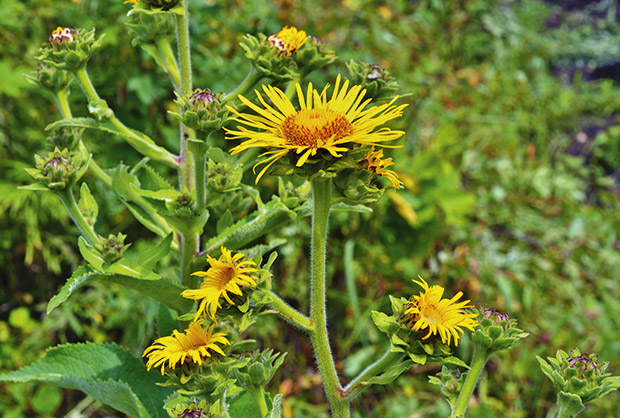
These work by “exciting” or stimulating the walls of the upper digestive tract to increase the expulsion of mucus. They are typically used when you have thick congestion deep in the lungs. They include:
• Elecampane
• Kūmarahou
• Hyssop
• Lobelia
Elecampane is not only an expectorant but an antibacterial, anti-inflammatory and a demulcent: a substance that relieves irritation of the mucous membranes. Elecampane is a favourite herb of mine.
It’s easy to grow and, as a bonus, produces tall stems with sunflower-like blooms each summer and autumn. The roots are used medicinally so you can harvest the flowers for bouquets.
This hardy perennial grows in sun or partial shade. It dies down each winter but reliably returns come spring.
WARMING EXPECTORANTS
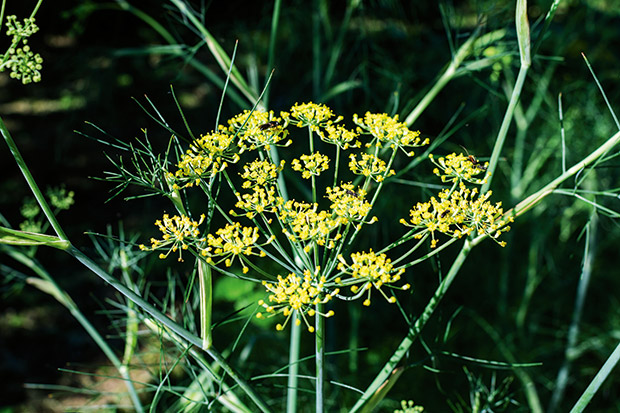
Warming expectorants can increase blood flow to the respiratory mucosa, which prompts the reflex reaction. They are useful for a cough associated with coldness or poor circulation. These are typically pungent spices like:
• Aniseed
• Cinnamon
• Fennel
• Ginger
• Angelica root
• Garlic
These – especially in the case of sulphur-containing garlic – help to thin mucus, making it easier to move.
A very simple home remedy might be a hot infusion (tea) of cinnamon and ginger or an onion and garlic soup.
RELAXING EXPECTORANTS
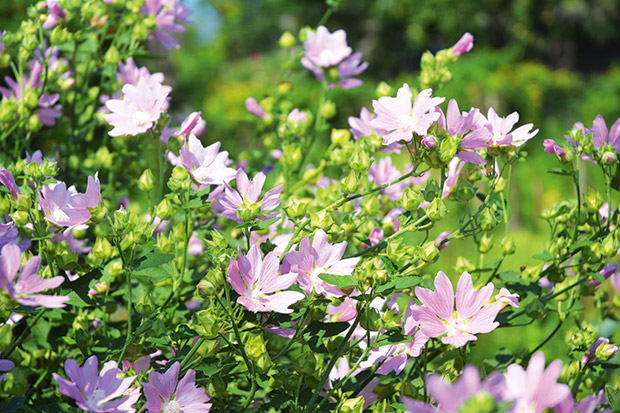
These are antispasmodic herbs, which can help calm coughing spasms.
They include:
• Hyssop
• Liquorice
• Marshmallow
• Mullein
• Ribwort (yes, that weed in your garden)
• Thyme
• White horehound
Thyme is antispasmodic, but it’s also antimicrobial, so it may help recover from infection.
Liquorice root is anti-inflammatory, so it is very soothing to the mucous membrane. It is also antimicrobial and acts as a demulcent, which aids in the expulsion of mucus.
Demulcent herbs contain mucilage: a slimy, slippery substance that provides a protective coating for the mucous membranes, soothing and reducing irritation – ideal for dry coughs.
Because liquorice is naturally sweet, it’s added to many commercial cough formulas.
If you wanted to dig up your mondo grass (Ophiopogon japonicus), you could use this as an expectorant as well.
It acts as a bronchial demulcent and antitussive – a substance that suppresses coughs – so it is especially useful for chronic dry coughs.
Homemade herbal remedies
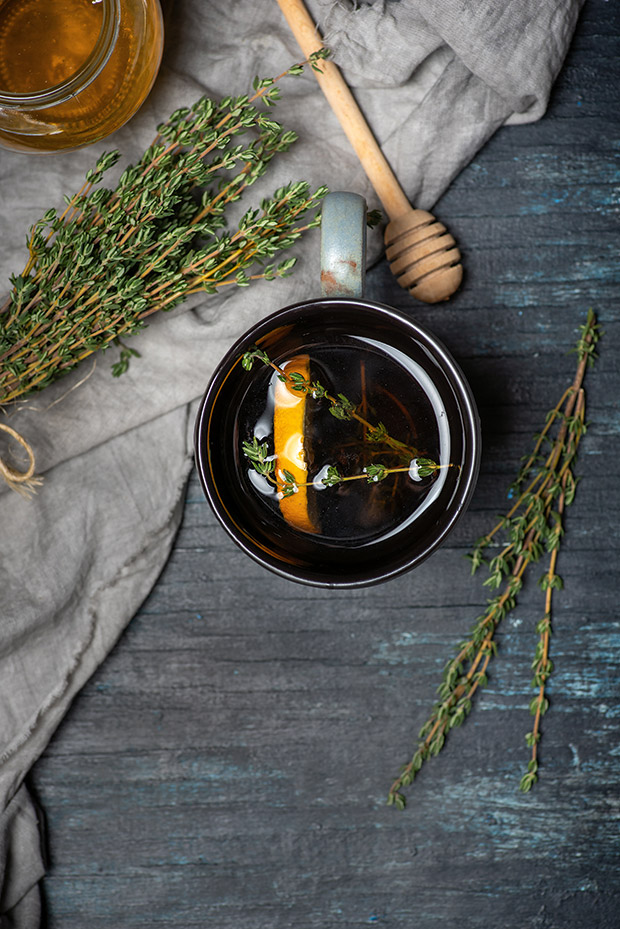
The very easiest cough remedy to make at home is thyme tea. Add some sage and gargle it if you have a sore throat, or sip on it throughout the day. To make, infuse a tablespoon of fresh or dried thyme leaves in boiled water for eight to ten minutes.
Thyme Oxymel
An oxymel is a sweet and sour herbal remedy that combines the herb with honey and apple cider vinegar. Because they are sweet, oxymels were traditionally used to administer foul-tasting herbal remedies. Oxymels are great for kids who refuse to take other medicines, although infants younger than 12 months should not consume honey.
Honey is a demulcent and contains antimicrobial properties while the vinegar has antioxidant effects.
You can make this one in advance in preparation for winter.
INGREDIENTS
Fresh or dried thyme
Manuka honey
Apple cider vinegar
METHOD
If using fresh leaves, pick and leave to wilt overnight. Fill a jar with the chopped fresh thyme leaves, or half fill with dried leaves. Add honey to the halfway mark, then top with apple cider vinegar. Stir well, then fit a plastic lid and steep for three to four weeks in a warm room out of direct sunlight. Turn the jar upside down once a day. Strain into a clean, airtight jar or bottle and take a teaspoon or two when needed.
Cough Syrup
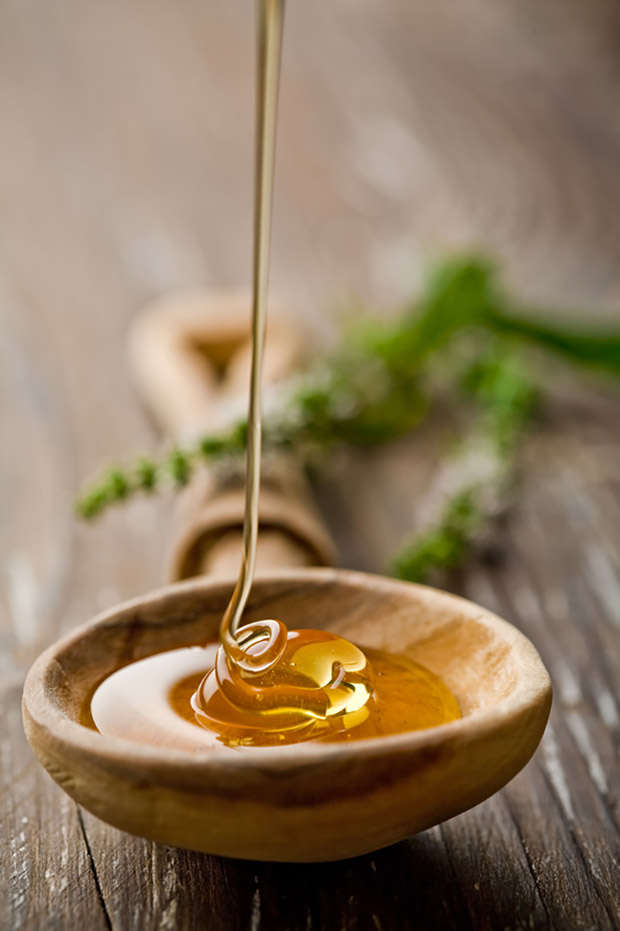
Most cough syrups contain a bit of everything: an expectorant to break up and expel the mucus, a demulcent to soothe inflamed and irritated tissues, an antispasmodic to calm things down, an antimicrobial to get rid of the bugs, and something to make it taste good!
You can make a simpler concoction if you prefer. Just choose two to three herbs according to your cough (thick mucous, coughing spasms etc) and make the syrup with the instructions below.
Store in the fridge.
INGREDIENTS
3 tablespoons dried elecampane root
3 tablespoons dried white horehound
1 ½ tablespoons dried thyme
2 ½ cm knob ginger root, roughly chopped
1 tablespoon dried liquorice root
1 tablespoon fennel seed
1 cup honey
1 litre of water
METHOD
Place elecampane, white horehound, thyme, ginger, liquorice and fennel seed in a saucepan and cover with one litre of water.
Slowly bring to the boil, then immediately reduce the heat to a simmer. Simmer until the water has reduced by half.
Allow to cool slightly, then strain the mixture, pressing to get all the liquid from the herbs.
Return the liquid to the saucepan. Add honey.
Heat on low until the honey is mixed through (keep the heat low or you will destroy the honey’s antibiotic and enzymatic properties).
Allow to cool, then pour into a sterilised bottle and store in the fridge for up to one month.
Dose: Take one teaspoon every 30 minutes to two hours, as needed.
Nose and Sinus Clearer
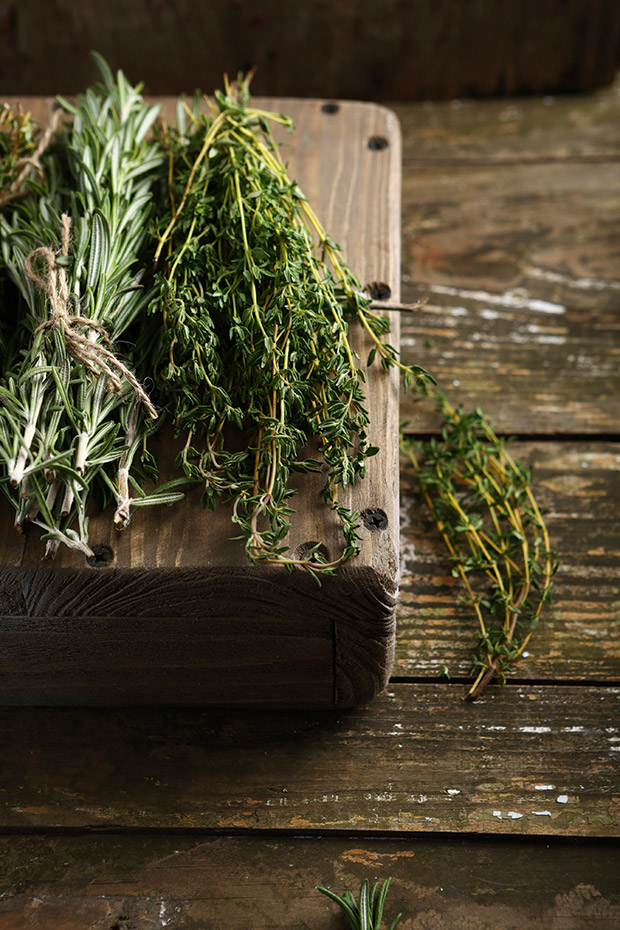
Inhaling this steam remedy can help clear mucus from the sinuses. This needs to be done several times a day.
INGREDIENTS
½ cup equal amounts of bruised rosemary and eucalyptus leaves.
A handful of thyme
Boiling water
METHOD
Place freshly bruised rosemary and eucalyptus leaves in a heatproof bowl, then cover with boiling water.
Cover with a towel, pop your head beneath it (test with your hand first to ensure it is not too hot for you) and, with your eyes closed, inhale deeply for two to five minutes.
You can also put a few drops of rosemary and eucalyptus oils on your shower floor before jumping in the shower.
For a native herb slant, use freshly chopped kawakawa, manuka and rewarewa leaves in a steam bath.
Wild cherry bark
This is an excellent herb for soothing night coughs, as it is a relaxing expectorant, an antitussive and has mild sedative properties. But it cannot be grown in New Zealand.
If you would like to include this in your mixture, you will need to purchase it from online herb suppliers.
NOTE
Consult your primary healthcare provider if coughs are persistent or accompany other severe symptoms. A chronic cough may be an indication of an underlying problem.
Love this story? Subscribe now!
 This article first appeared in NZ Lifestyle Block Magazine.
This article first appeared in NZ Lifestyle Block Magazine.
